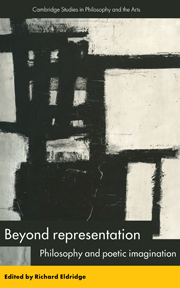Book contents
- Frontmatter
- Contents
- List of contributors
- Editor's acknowledgments
- 1 Introduction: from representation to poiesis
- 2 Confession and forgiveness: Hegel's poetics of action
- 3 The values of articulation: aesthetics after the aesthetic ideology
- 4 In their own voice: philosophical writing and actual experience
- 5 Poetry and truth-conditions
- 6 Fractal contours: chaos and system in the Romantic fragment
- 7 The mind's horizon
- 8 Kant, Hölderlin, and the experience of longing
- 9 Wordsworth and the reception of poetry
- 10 Self-consciousness, social guilt, and Romantic poetry: Coleridge's Ancient Mariner and Wordsworth's Old Pedlar
- 11 Her blood and his mirror: Mary Coleridge, Luce Irigaray, and the female self
- 12 Scene: an exchange of letters
- Index
1 - Introduction: from representation to poiesis
Published online by Cambridge University Press: 06 July 2010
- Frontmatter
- Contents
- List of contributors
- Editor's acknowledgments
- 1 Introduction: from representation to poiesis
- 2 Confession and forgiveness: Hegel's poetics of action
- 3 The values of articulation: aesthetics after the aesthetic ideology
- 4 In their own voice: philosophical writing and actual experience
- 5 Poetry and truth-conditions
- 6 Fractal contours: chaos and system in the Romantic fragment
- 7 The mind's horizon
- 8 Kant, Hölderlin, and the experience of longing
- 9 Wordsworth and the reception of poetry
- 10 Self-consciousness, social guilt, and Romantic poetry: Coleridge's Ancient Mariner and Wordsworth's Old Pedlar
- 11 Her blood and his mirror: Mary Coleridge, Luce Irigaray, and the female self
- 12 Scene: an exchange of letters
- Index
Summary
Twice upon a time, in both the seventeenth to eighteenth centuries and again in the twentieth-century heydays of logical atomism and logical positivism, the task of philosophy – so Richard Rorty and Ian Hacking have reminded us – was to provide a critical theory of representations of the world. By sorting representations – mental or linguistic, as may be – into the accurate and well-founded vs. the inaccurate and ill-founded, different cultural practices might be submitted to critical judgment. This is possible insofar as “culture is,” in Rorty's words, “the assemblage of claims to knowledge,” or perhaps, more weakly, in so far as cultural practices as various as preparing food, making paintings, building houses, and telling stories about ancestors all presuppose claims to knowledge. If the representations or knowledge-claims that a given bit of culture either is or presupposes are themselves in good order, then that bit of culture is itself well-founded; if not, then not. If that – foxglove – is in fact a poisonous plant, then (given a desire to avoid the poisonous) one ought not to eat it; if mass is in fact an essential property of physical objects, then one will do best to understand how physical bodies will move under certain conditions by, among other things, weighing them. Out of a critical theory of representations, philosophy, it was hoped, would derive a critical theory of culture.
As Rorty, Hacking, and numerous other writers on the death of epistemology have suggested, however, this project has also twice foundered on a dilemma. What is the status of the intended theory of representations itself?
- Type
- Chapter
- Information
- Beyond RepresentationPhilosophy and Poetic Imagination, pp. 1 - 33Publisher: Cambridge University PressPrint publication year: 1996
- 2
- Cited by



